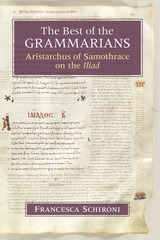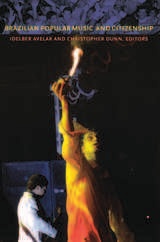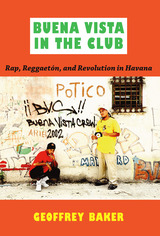105 books about Latin and 4
start with B
105 books about Latin and 4
105 books about Latin
4 start with B start with B
4 start with B start with B

The Best of the Grammarians
Aristarchus of Samothrace on the Iliad
Francesca Schironi
University of Michigan Press, 2018
A founding father of the “art of philology,” Aristarchus of Samothrace (216–144 BCE) made a profound contribution to ancient scholarship. In his study of Homer’s Iliad, his methods and principles inevitably informed, even reshaped, his edition of the epic. This systematic study places Aristarchus and his fragments preserved in the Iliadic scholia, or marginal annotations, in the context and cultural environment of his own time.
Francesca Schironi presents a more robust picture of Aristarchus as a scholar than anyone has offered previously. Based on her analysis of over 4,300 fragments from his commentary on the Iliad, she reconstructs Aristarchus’ methodology and its relationship to earlier scholarship, especially Aristotelian poetics. Schironi departs from the standard commentary on individual fragments, and instead organizes them by topic to produce a rigorous scholarly examination of how Aristarchus worked.
Combining the accuracy and detail of traditional philology with a big-picture study of recurrent patterns and methodological trends across Aristarchus’ work, this volume offers a new approach to scholarship in Alexandrian and classical philology. It will be the go-to reference book on this topic for many years to come, and will usher in a new way of addressing the highly technical work of ancient scholars without losing philological accuracy. This book will be valuable to classicists and philologists interested in Homer and Homeric criticism in antiquity, Hellenistic scholarship, and ancient literary criticism.
Francesca Schironi presents a more robust picture of Aristarchus as a scholar than anyone has offered previously. Based on her analysis of over 4,300 fragments from his commentary on the Iliad, she reconstructs Aristarchus’ methodology and its relationship to earlier scholarship, especially Aristotelian poetics. Schironi departs from the standard commentary on individual fragments, and instead organizes them by topic to produce a rigorous scholarly examination of how Aristarchus worked.
Combining the accuracy and detail of traditional philology with a big-picture study of recurrent patterns and methodological trends across Aristarchus’ work, this volume offers a new approach to scholarship in Alexandrian and classical philology. It will be the go-to reference book on this topic for many years to come, and will usher in a new way of addressing the highly technical work of ancient scholars without losing philological accuracy. This book will be valuable to classicists and philologists interested in Homer and Homeric criticism in antiquity, Hellenistic scholarship, and ancient literary criticism.
[more]

Bioscientific Terminology
Words from Latin and Greek Stems
Donald M. Ayers
University of Arizona Press, 1972
A Valuable Classroom Tool:
Separate sections on Latin and Greek derivations. Each section has 20 lessons—with assignments following each lesson—giving the user a vast technical vocabulary and increased word-recognition ability.
A Definitive Reference:
Hundreds of Greek and Latin stems, prefixes, and suffixes show the precise application of the classical languages to biological and medical usage. Topic-organized bibliography, index of bases.
Separate sections on Latin and Greek derivations. Each section has 20 lessons—with assignments following each lesson—giving the user a vast technical vocabulary and increased word-recognition ability.
A Definitive Reference:
Hundreds of Greek and Latin stems, prefixes, and suffixes show the precise application of the classical languages to biological and medical usage. Topic-organized bibliography, index of bases.
[more]

Brazilian Popular Music and Citizenship
Idelber Avelar and Christopher Dunn, eds.
Duke University Press, 2011
Covering more than one hundred years of history, this multidisciplinary collection of essays explores the vital connections between popular music and citizenship in Brazil. While popular music has served as an effective resource for communities to stake claims to political, social, and cultural rights in Brazil, it has also been appropriated by the state in its efforts to manage and control a socially, racially, and geographically diverse nation. The question of citizenship has also been a recurrent theme in the work of many of Brazil’s most important musicians. These essays explore popular music in relation to national identity, social class, racial formations, community organizing, political protest, and emergent forms of distribution and consumption. Contributors examine the cultural politics of samba in the 1930s, the trajectory of middle-class musical sensibility associated with Música Popular Brasileira (MPB), rock and re-democratization in the 1980s, music and black identity in Bahia, hip hop and community organizing in São Paulo, and the repression of baile funk in Rio in the 1990s. Among other topics, they consider the use of music by the Landless Workers’ Movement, the performance of identity by Japanese Brazilian musicians, the mangue beat movement of Recife, and the emergence of new regional styles, such as lambadão and tecnobrega, that circulate outside of conventional distribution channels. Taken together, the essays reveal the important connections between citizenship, national belonging, and Brazilian popular music.
Contributors. Idelber Avelar, Christopher Dunn, João Freire Filho, Goli Guerreiro, Micael Herschmann, Ari Lima, Aaron Lorenz, Shanna Lorenz, Angélica Madeira, Malcolm K. McNee, Frederick Moehn, Flávio Oliveira, Adalberto Paranhos, Derek Pardue, Marco Aurélio Paz Tella, Osmundo Pinho, Carlos Sandroni, Daniel Sharp, Hermano Vianna, Wivian Weller
[more]

Buena Vista in the Club
Rap, Reggaetón, and Revolution in Havana
Geoffrey Baker
Duke University Press, 2011
In Buena Vista in the Club, Geoffrey Baker traces the trajectory of the Havana hip hop scene from the late 1980s to the present and analyzes its partial eclipse by reggaetón. While Cuban officials initially rejected rap as “the music of the enemy,” leading figures in the hip hop scene soon convinced certain cultural institutions to accept and then promote rap as part of Cuba’s national culture. Culminating in the creation of the state-run Cuban Rap Agency, this process of “nationalization” drew on the shared ideological roots of hip hop and the Cuban nation and the historical connections between Cubans and African Americans. At the same time, young Havana rappers used hip hop, the music of urban inequality par excellence, to critique the rapid changes occurring in Havana since the early 1990s, when the Soviet Union fell, its subsidy of Cuba ceased, and a tourism-based economy emerged. Baker considers the explosion of reggaetón in the early 2000s as a reflection of the “new materialism” that accompanied the influx of foreign consumer goods and cultural priorities into “sociocapitalist” Havana. Exploring the transnational dimensions of Cuba’s urban music, he examines how foreigners supported and documented Havana’s growing hip hop scene starting in the late 1990s and represented it in print and on film and CD. He argues that the discursive framing of Cuban rap played a crucial part in its success.
[more]
READERS
Browse our collection.
PUBLISHERS
See BiblioVault's publisher services.
STUDENT SERVICES
Files for college accessibility offices.
UChicago Accessibility Resources
home | accessibility | search | about | contact us
BiblioVault ® 2001 - 2024
The University of Chicago Press









